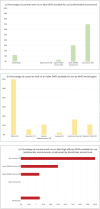Ethical use of off-label disease-modifying therapies for multiple sclerosis
- PMID: 34304636
- PMCID: PMC8358542
- DOI: 10.1177/13524585211030207
Ethical use of off-label disease-modifying therapies for multiple sclerosis
Abstract
Background: Off-label disease-modifying therapies (DMTs) for multiple sclerosis (MS) are used in at least 89 countries. There is a need for structured and transparent evidence-based guidelines to support clinical decision-making, pharmaceutical policies and reimbursement decisions for off-label DMTs.
Objectives/results: The authors put forward general principles for the ethical use of off-label DMTs for treating MS and a process to assess existing evidence and develop recommendations for their use.
Conclusion: The principles and process are endorsed by the World Federation of Neurology (WFN), American Academy of Neurology (AAN), European Academy of Neurology (EAN), Americas Committee for Treatment and Research in Multiple Sclerosis (ACTRIMS), European Committee for Treatment and Research in Multiple Sclerosis (ECTRIMS), Middle-East North Africa Committee for Treatment and Research in Multiple Sclerosis (MENACTRIMS) and Pan-Asian Committee for Treatment and Research in Multiple Sclerosis (PACTRIMS), and we have regularly consulted with the Brain Health Unit, Mental Health and Substance Use Department at the World Health Organization (WHO).
Keywords: Disease-modifying therapies; access to treatment; guideline; off-label treatment.
Conflict of interest statement
Figures


Comment in
-
Fair and equitable treatment for multiple sclerosis in resource-poor regions: The need for off-label therapies and regional treatment guidelines.Mult Scler. 2021 Aug;27(9):1320-1322. doi: 10.1177/13524585211028806. Mult Scler. 2021. PMID: 34374317 No abstract available.
References
-
- McDonell J, Costello K, Laurson-Doube J, et al.. World Health Organization essential medicines list: Multiple sclerosis disease-modifying therapies application. Mult Scler 2020; 26(2): 153–158. - PubMed
-
- Laurson-Doube J, Rijke N, Costello K, et al.. Health-care disparities for people with multiple sclerosis. Lancet Neurol 2020; 19(3): 207–208. - PubMed
-
- Atlas of MS. Available at: https://www.atlasofms.org/ (accessed 31 March 2021).
-
- Marjolein W, Hoebert J, Vervloet M, et al.. Study on off-label use of medicinal products in the European Union: Report, 2019. Available at: http://publications.europa.eu/publication/manifestation_identifier/PUB_E... (accessed 6 May 2020).
MeSH terms
LinkOut - more resources
Full Text Sources
Medical

